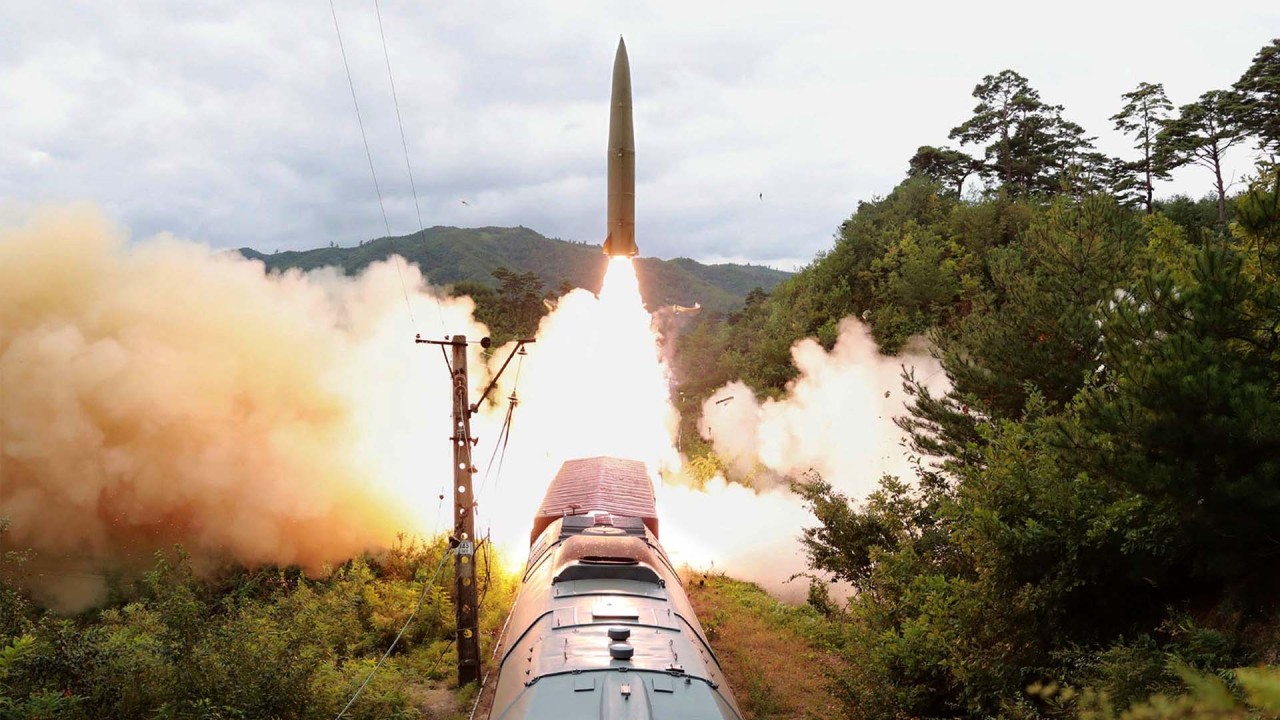
North Korea says US submarine deal and Asia-Pacific alliance could trigger ‘nuclear arms race’
- Last week the US announced a new three-way security pact with Australia and Britain, under which US nuclear submarines will be supplied to Canberra
- US President Joe Biden’s new Australia-US-Britain defence alliance is widely seen as aimed at countering the rise of China
“These are extremely undesirable and dangerous acts which will upset the strategic balance in the Asia-Pacific region and trigger off a chain of nuclear arms race,” North Korean state media KCNA quoted a foreign ministry official as saying.

02:15
North Korea’s test launch of railway-borne missile sparks international alarm
“This shows that the US is the chief culprit toppling the international nuclear non-proliferation system,” said a foreign news section chief at the ministry’s Department of Press and Information.
With few options to rein in North Korea, missile launches ‘won’t stop’
The spate of missile tests and bumper defence deals in the Pacific have highlighted a regional arms race that is intensifying as China-US rivalry grows.
“It is quite natural that neighbouring countries including China condemned these actions as irresponsible ones of destroying the peace and stability of the region,” the Pyongyang foreign ministry official said.

“The US double-dealing attitude getting all the more pronounced after the emergence of the new administration erodes the universally accepted international norm and order and seriously threatens the world peace and stability,” the North Korean foreign ministry official said.
The official added that North Korea “will certainly take a corresponding counteraction in case it has even a little adverse impact on the security of our country”.
Korean arms race heats up as North goes ballistic, South supersonic
The North Korean official made an apparent reference to the French complaints, saying that the US was being accused of back-stabbing even by its allies. The official said the North supports the views of China and other countries that the deal would destroy “regional peace and security and the international non-proliferation system and intensify arms races.”
“The current situation shows once again that [our] efforts to bolster national defence capabilities based on long-term perspectives should not be eased by even a bit,” the official said.
Also on Monday, a North Korean military think tank dismissed South Korea’s recently tested submarine-launched ballistic missile as clumsy and rudimentary but warned its development would rekindle cross-border tension.
Jang Chang-ha, chief of the Academy of the National Defence Science, a North Korean state-run weapons development and procurement centre, said in a commentary on the official KCNA news agency that media photographs of the latest South Korean missile showed a “sloppy” weapon that did not even have the right shape.

03:03
South Korea’s ‘apocalypse’ vault keeps seeds safe from earthquakes and nuclear blasts
The missile seemed to be a version of the South’s Hyunmoo surface-to-surface ballistic missiles with the warhead part an imitation of India’s K-15 SLBM, Jang said. “In a word, it should be called some clumsy work,” he said. “If it’s indeed an SLBM, it would only be in its rudimentary, infant stage.”
Jang said the weapon had not reached a phase where it had strategic and tactical value and would thus pose a threat to the North but questioned the intent of the South’s ongoing missile development.
“The South’s enthusiastic efforts to improve submarine weapons systems clearly presage intensified military tension on the Korean peninsula,” Jang said. “And at the same time, it awakens us again and makes us sure of what we ought to do.”
The North has suspended its testing of nuclear bombs and intercontinental-range ballistic missiles that could hit the US mainland since 2018 when Kim Jong-un initiated diplomacy with Trump while attempting to leverage his arsenal for badly needed sanctions relief.
Nuclear negotiations between Washington and Pyongyang have stalled since the collapse of a second Trump-Kim meeting in 2019, when the Americans rejected North Korean demands for major sanctions relief in exchange for dismantling an ageing nuclear facility, which would have amounted to only a partial surrender of its nuclear capabilities.
While maintaining its self-imposed moratorium on nuclear and ICBM tests, the North has continued testing shorter range weapons threatening US allies South Korea and Japan in an apparent effort to pressure the Biden administration over the stalled diplomacy.
Additional reporting by Associated Press, Reuters

.png?itok=arIb17P0)